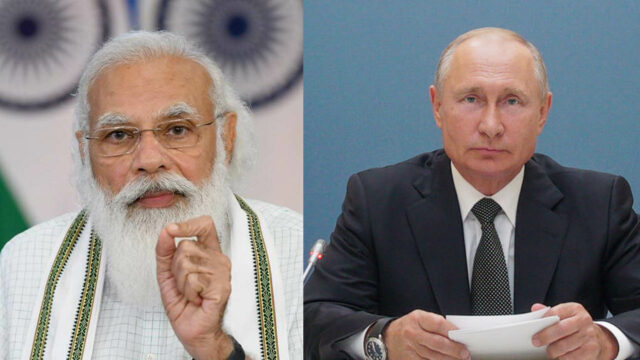NEW DELHI: A 45-minute chat between Narendra Modi and Vladimir Putin on Tuesday saw agreement on establishing a “bilateral channel” to discuss Afghanistan. Reports said they will consult each other over developments in Afghanistan and will set up combined teams comprising foreign ministry and national security officials to assess the future course of action.
Neither side mentioned the Taliban by name but the Russian foreign ministry was direct and specific in its interpretation of the Modi-Putin chat, saying that they “expressed determination to increase cooperation in opposing the spread of terrorist ideology and drugs threat emanating from Afghan territory”. By contrast, India’s Ministry of External Affairs merely stated that “the two leaders discussed the unfolding situation in Afghanistan and its implications for the region and the world … it was important for the two strategic partners to work together.”
The chat may enthuse those who recall the India-Russia-Iran link in the 1990s which saw them backing the Northern Alliance holed up in the Panjsher Valley. But the Northern Alliance does not exist. The current lot in the Panjsher include Tajiks, Uzbeks, some Hazaras and Pashtuns led by Ahmad Massoud and Amrullah Saleh. The Taliban fighters closing in around them are of roughly the same ethnic persuasion with perhaps Pashtuns predominating.
For all of Massoud and Saleh’s tough talk, there’s no guarantee their fighters won’t melt away as the Afghan army did. The Russians say they are not backing the Panjsheris. India may prefer to wait and watch, hoping against hope for a benign Taliban dispensation in Kabul. What Iran is doing is not clear (but Tehran has confirmed it has resumed export of fuel to Afghanistan at the request of the Taliban).
“The overall picture is one of uncertainty,” says P.S. Raghavan, former head of the National Security Advisory Board. “The Americans will leave in a matter of days, which is what Iran, China and Russia have always wanted. But the chaotic manner of their departure with the Taliban fully in charge in Kabul has deepened the security concerns of Afghanistan’s immediate neighbours.”
There’s no telling how the Taliban is going to behave. Will it be focused on domestic issues including governance (of which it has little experience), or will it seek to “export its Islamic revolution” (in the past it has described jihad as a fundamental Islamic duty). The Taliban remains close to a host of terrorist groups that have mixed and melded in all these years of fighting. They range from Al Qaeda, the Uyghur militants of Xinjiang province in China, and the Pakistan-based Lashkar-e-Toiba and Jaish-e-Mohammad (its operational commander Mufti Rauf Azhar called on the Taliban military chief Mullah Yaqoob in Kandahar last week).
Hopes that the Taliban will tell them to leave Afghanistan or temper their ambitions are just that, hopes. StratNews Global learns that the Taliban has told China to “treat its Muslims better”. If this is indeed true, it suggests that China, for all its money power and BRI heft, has to tread carefully with the Taliban. This may apply equally to Russia given the presence of Chechen militants in Taliban ranks. There are also Uzbeks and Tajiks, so the wherewithal exists for a determined Taliban push into Central Asia to advance the Islamic emirate.
This is where the divergence between China and Russia could become apparent, says Raghavan. “So long as the U.S. was in Afghanistan, they had common cause to oppose it. But with the U.S. on its way out, that cement could be weakening. China may seek to bring the Central Asian states together to build a common front against any Taliban advance. Expect Russia to counter that since it sees Central Asia as in its sphere of influence.”
There’s a silver lining for India. The opening of a “bilateral channel” between Delhi and Moscow could be the first indication that the two capitals are closing the door on the ups and downs of the recent past. Raghavan believes some of the downs in the relationship may have been more a matter of perception, for instance, India being excluded from the extended troika discussions on Afghanistan. There was little India could have contributed since the purpose was to bring the Taliban to the table. Which also explains Moscow’s outreach to Islamabad.
The other point is the India-U.S. relationship. There’s no denying India’s unhappiness with the manner in which the U.S. is getting out of Afghanistan. A U.S. State Department release on a meeting between Secretary of State Blinken and his Indian counterpart S. Jaishankar in New York a few days ago, spoke volumes for the little it conveyed.
“Secretary Blinken and Minister Jaishankar discussed Afghanistan and agreed to continued coordination.”
It does not mean the bilateral Delhi-Washington relationship is in free fall. Relations otherwise remain good. The U.S. remains India’s preferred partner to counter China. But Afghanistan has left an aftertaste that South Block will find hard to get over.
















